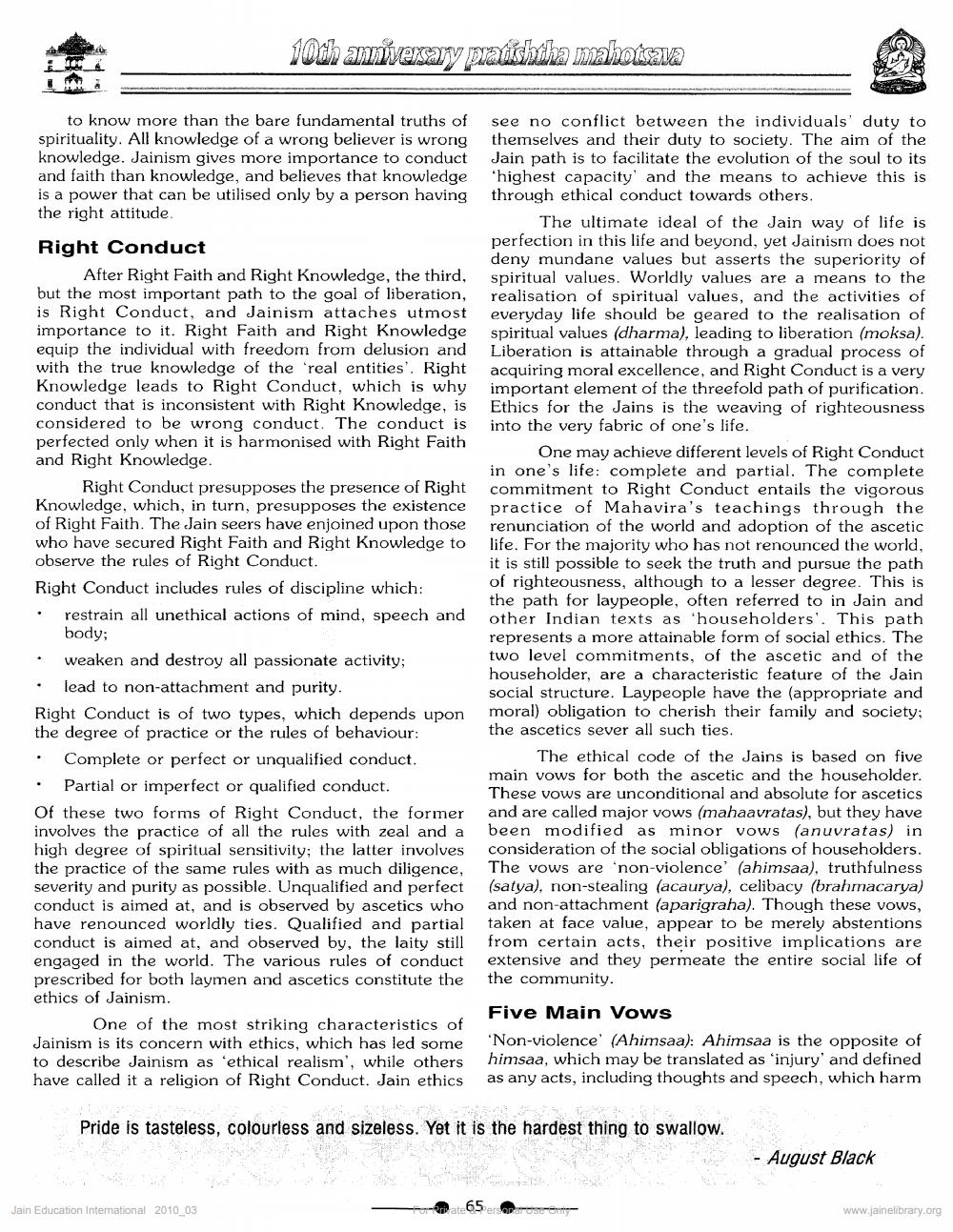________________
to know more than the bare fundamental truths of spirituality. All knowledge of a wrong believer is wrong knowledge. Jainism gives more importance to conduct and faith than knowledge, and believes that knowledge is a power that can be utilised only by a person having the right attitude.
10th anniversary pratishtha mabotara
Right Conduct
After Right Faith and Right Knowledge, the third, but the most important path to the goal of liberation, is Right Conduct, and Jainism attaches utmost importance to it. Right Faith and Right Knowledge equip the individual with freedom from delusion and with the true knowledge of the 'real entities'. Right Knowledge leads to Right Conduct, which is why conduct that is inconsistent with Right Knowledge, is considered to be wrong conduct. The conduct is perfected only when it is harmonised with Right Faith and Right Knowledge.
Right Conduct presupposes the presence of Right Knowledge, which, in turn, presupposes the existence of Right Faith. The Jain seers have enjoined upon those who have secured Right Faith and Right Knowledge to observe the rules of Right Conduct.
Right Conduct includes rules of discipline which:
restrain all unethical actions of mind, speech and body;
weaken and destroy all passionate activity; lead to non-attachment and purity.
Right Conduct is of two types, which depends upon the degree of practice or the rules of behaviour:
Complete or perfect or unqualified conduct. Partial or imperfect or qualified conduct.
Of these two forms of Right Conduct, the former involves the practice of all the rules with zeal and a high degree of spiritual sensitivity; the latter involves the practice of the same rules with as much diligence, severity and purity as possible. Unqualified and perfect conduct is aimed at, and is observed by ascetics who have renounced worldly ties. Qualified and partial conduct is aimed at, and observed by, the laity still engaged in the world. The various rules of conduct prescribed for both laymen and ascetics constitute the ethics of Jainism.
.
One of the most striking characteristics of Jainism is its concern with ethics, which has led some to describe Jainism as 'ethical realism', while others have called it a religion of Right Conduct. Jain ethics
Jain Education International 2010_03
see no conflict between the individuals' duty to themselves and their duty to society. The aim of the Jain path is to facilitate the evolution of the soul to its 'highest capacity' and the means to achieve this is through ethical conduct towards others.
The ultimate ideal of the Jain way of life is perfection in this life and beyond, yet Jainism does not deny mundane values but asserts the superiority of spiritual values. Worldly values are a means to the realisation of spiritual values, and the activities of everyday life should be geared to the realisation of spiritual values (dharma), leading to liberation (moksa). Liberation is attainable through a gradual process of acquiring moral excellence, and Right Conduct is a very important element of the threefold path of purification. Ethics for the Jains is the weaving of righteousness into the very fabric of one's life.
One may achieve different levels of Right Conduct in one's life: complete and partial. The complete commitment to Right Conduct entails the vigorous practice of Mahavira's teachings through the renunciation of the world and adoption of the ascetic life. For the majority who has not renounced the world, it is still possible to seek the truth and pursue the path of righteousness, although to a lesser degree. This is the path for laypeople, often referred to in Jain and other Indian texts as 'householders'. This path represents a more attainable form of social ethics. The two level commitments, of the ascetic and of the householder, are a characteristic feature of the Jain social structure. Laypeople have the (appropriate and moral) obligation to cherish their family and society; the ascetics sever all such ties.
The ethical code of the Jains is based on five main vows for both the ascetic and the householder. These vows are unconditional and absolute for ascetics and are called major vows (mahaavratas), but they have been modified as minor vows (anuvratas) in consideration of the social obligations of householders. The vows are non-violence' (ahimsaa), truthfulness (satya), non-stealing (acaurya), celibacy (brahmacarya) and non-attachment (aparigraha). Though these vows, taken at face value, appear to be merely abstentions from certain acts, their positive implications are extensive and they permeate the entire social life of the community.
Five Main Vows
Non-violence' (Ahimsaa): Ahimsaa is the opposite of himsaa, which may be translated as 'injury' and defined as any acts, including thoughts and speech, which harm
Pride is tasteless, colourless and sizeless. Yet it is the hardest thing to swallow.
s. Yet it is the h
Forate 65Persoperose only
August Black
www.jainelibrary.org




